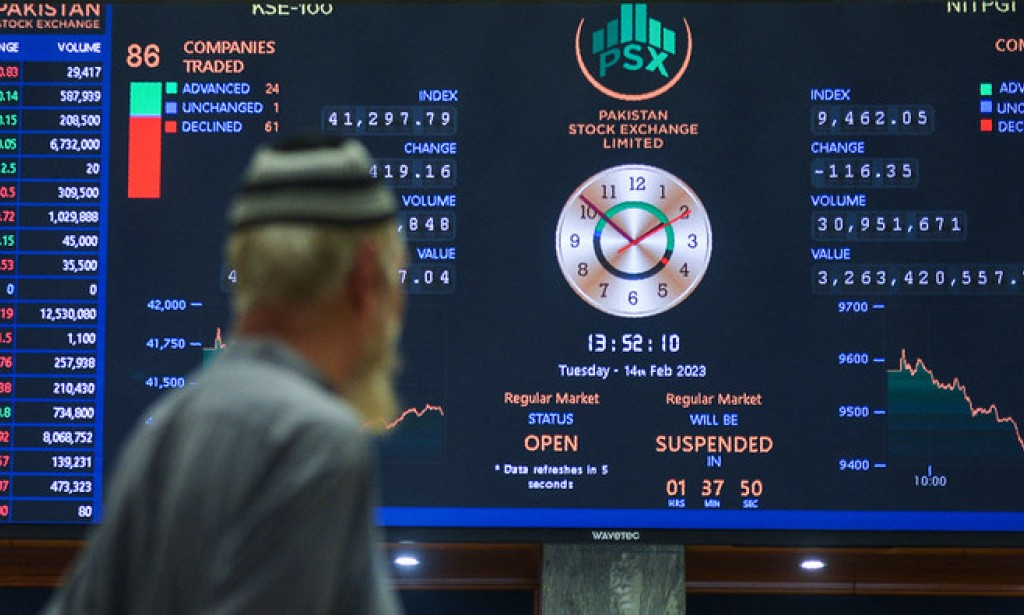Stock brokers
and analysts reported that Pakistani equities broke through the 62,000-point barrier on Monday, setting new records for the market. The bullish sentiment was stoked by positive earnings, expectations of Gulf countries investing, and a successful review of a $3 billion International Monetary Fund (IMF) bailout facility. With hopes of an IMF tranche of $700 million and recent positive developments during Prime Minister Anwar-ul-Haq Dakar's visit to the Middle East, which reignited hopes of multibillion dollar investment in the South Asian nation, the benchmark KSE100 index gained 802 points to close at 62,493 points.

Ahsan Mehanti,
a senior equity analyst, told Arab News that "stocks closed at new all-time high amid speculations ahead of landmark free trade agreement with GCC (Gulf Cooperation Council), government measures over Pakistan Sovereign Wealth Fund, and IMF board approval for release of $700 million tranche." A catalyst role was played by the rupee's stability in the face of renewed foreign interest, a spike in exports of 7.66 percent, and a decrease in the trade deficit of 31.7 percent in November.in the record close, Mehanti claims. The KSE100, the main stock index, has had an incredible journey since July 3, when the South Asian nation signed a short-term bailout facility with the IMF. The index gained 18,594 points, or 42.3 percent.

Financial experts in Pakistan predict that the KSE100 index will surpass 80,000 points by the end of the following year due to the combination of strong earnings growth, attractive valuation, significant domestic liquidity, and relatively stable economic growth. "Pakistan Investment Strategy 2024," a report released on Monday by Karachi-based brokerage firm Arif Habib Limited, redefines the allure of valuation. It shows an upside of 32% from the index closing of December 1, 2023. Our December 2024 target for the KSE-100 Index is set at 81,259 points.
The following year would see the following key themes emerge: strong valuations, significant domestic liquidity, improving macroeconomic conditions, and monetary easing.
All sectors should see strong growth, with double-digit earnings growth predicted for most. According to the report, "Our outlook for the KSE100 indicates an expected 17.2 percent growth in earnings in 2024."
It was noted that a major factor in the recent announcement regarding the general elections scheduled for February 8th was the increase in stock prices.
The report went on,
"We believe that the election of a new government will usher in a much-needed period of political stability, which will be good for the stock market." "We also believe that the enduring concerns about an election postponement are baseless."
Pakistan is about to conclude its most recent standby agreement with the IMF and will need to enrol in a new bailout scheme right away. For the economic reforms started by the current caretaker administration to continue, timely elections and the installation of a newly elected government are imperative.

The recent visit of Prime Minister Kakar
to Kuwait and the United Arab Emirates (UAE) raised expectations of massive investment inflows into the South Asian nation, which in turn boosted the performance of the Pakistani stock exchange. Memoranda of understanding (MoUs) worth billions of dollars were signed last week between Pakistan and the United Arab Emirates (UAE) in a variety of sectors. As a result, the Gulf state is expected to invest $20–25 billion in Pakistan.
Ejaz Gohar,
the caretaker minister of commerce, posted on X on Saturday stating that he and Saudi Arabia had reached an agreement on investment modalities concerning a proposed free trade agreement (FTA) with the Gulf Cooperation Council (GCC). Gohar was visiting Saudi Arabia at the time of this development.
The rise of the Pakistani stock market above 62,000 points is a significant milestone, reflecting positive investor sentiment and economic prospects within the country. Such an upsurge often indicates confidence in the economy, driven by various factors contributing to market growth.
Factors Contributing to the Stock Market Rise:
Economic Reforms: Government initiatives, policy reforms, and economic stability measures can bolster investor confidence, positively impacting the stock market.
Corporate Performance: Strong financial results and growth prospects of listed companies can attract investors, driving the market index upwards.
Foreign Investment: Increased foreign interest in the Pakistani market can inject liquidity and stimulate market growth.
Global Economic Conditions: Global economic trends and stability can influence investor behavior, impacting the performance of emerging markets like Pakistan.
Political Stability: A stable political environment often correlates with a positive market outlook, as it provides a conducive atmosphere for economic growth.
Potential for Reaching 81,000 Points:
The projection of the market crossing 81,000 points by the following year reflects optimism among investors. Several factors could contribute to such an ambitious growth target:
Continued Economic Reforms: Implementation of further reforms and policies that attract investment and stimulate economic growth.
Corporate Earnings: Consistent growth in corporate earnings and performance can drive the market index higher.
Infrastructure Development: Investments in infrastructure projects, technology, and other sectors that drive economic development.
Foreign Investments: Continued interest and inflow of foreign investments into Pakistan's market can contribute to achieving the projected index level.
Risks and Challenges:
Economic Volatility: Global economic uncertainties or sudden changes in local economic conditions can impact market stability.
Geopolitical Factors: Regional tensions or geopolitical instability can create uncertainty, affecting investor confidence.
Market Corrections: Sudden market corrections due to overvaluation or external shocks could hinder the market's upward trajectory.

Conclusion:
While the rise of the Pakistani stock market to above 62,000 points is promising, reaching 81,000 points within a year is an ambitious target. It depends on various internal and external factors, including sustained economic reforms, corporate performance, foreign investments, and global economic conditions. Monitoring these factors and their impact on the market will be crucial in assessing the feasibility of achieving the projected market index. Investors should approach such projections with caution, considering the inherent risks and uncertainties in financial markets.



You must be logged in to post a comment.